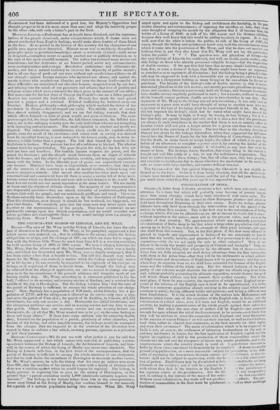COLONIZATION OF INDIA.
GLOBE—A letter from Calcutta mentions a fact which may not excite much attention for a time. but which will probably soon become of greater import. ance than many changes which have been introduced with more noise. lla! Governor-General of India has agreed to allow European planters and others to hold land throughout Hindostan in their own names. EVCII the indigo planters hitherto have only held them through the intervention and at the mercy of the natives in whom they confide. This is the first step to the colonization of India; a change which, if it can be effected—as we see no reason to doubt that it inav- without injustice to the natives, must add to the present value, and even to the security of that country.. The apprehensions which are commonly entertained of colonization of India seem to be, that when a large white population shall hale sprung up in India, it may follow the example of other great colonies, and sepa- rate itself from this country. But, in the first place, if this fear were allowed to prevail to impede any improvement ill India—if we are constantly to bear in mind that the wealth, activity, and greatness of that possession is the mad to its separation—why do we not apply the rule to other colonies ? Why do we labour to increase the wealth and prosperity of Canada and Australia? Only, we presume, under the belief, that whatever be the ultimate fate of those countries when they are fully peopled, we shall derive advantage from the free intercourse with them in the mean time—that they will be tlie settlements in which millions of Englishmen and descendants of Englishmen will be prosperous; and that even when they do separate from us, we shall have extended the honour of the English name and the welfare of the whole race. But the ntmost jealousy of the pros- perity of our colonies would diminish the advantages we should reap from them, and, without probably preventing the ultimate separation, would destroy the good will winch future nations may feel towards their mother country. But, in the next place, if there be any country, the separation of which from England on ac- count of the infusion of the English race is least to be apprehended, it is Milks There is a numerous population already existing in the country (and which must continue to exist), having different habits and opinions, and being a different race from Englishmen. It is the actual division of the natives into Mahometans and Gentoos which forms one of the securities of the English rule in India; and the introduction of a third class, even if it were not English, would be an additional security, by making a general union of the whole people against their rulers less probable. But when the new class of settlers will be English—not numerous enough forages, without the aid of the Government, to be secure—is it likely that they will be anxious to sever the connexion with England, and trust themselves to the mercies of native Princes ? or will not their interest, as well as their feelings, lead them rather to cherish that connexion, as the best security for their rights, and even their existence? The mode of colonization which is to be expected in India is not, of course, the settlement of labouring husbandmen on the sod, or ordinary mechanics in towns, but the free application of English capital and the higher descriptions of skill to the production of those commodities which the climate anti the soil and the cheapness of labour may render profitable, and to the improvements which the country stands in need of. A population attracted to India by these views can never be formidable by its numbers. A more reasonable ground of apprehension, or a more reasonable subject for precaution, is the diffi- culty of regulating the transactions between natives and Eoslishmen, so that former shall not be subject to oppression, while the la! o!. !sive a fair admuustra- tion of justice. Englishmen may be dissatisfied at beie.• iveted to the ordinary tribunals of the country ; and it will be a greater hard - • t., subject the tiauves
with whom they deal in the interior, to the English• the Jurisdiction of.
the supreme courts at the presidencies. But the dit-: : is not insuperable,
and, in settling it, the interest of the mass of the nati% be first consuheii Without some colonization, free trade will not produce :•s effects.. The pro-
duction of commodities in the East must be quickened, az. ,;11 as their exchange facilitated.


















 Previous page
Previous page